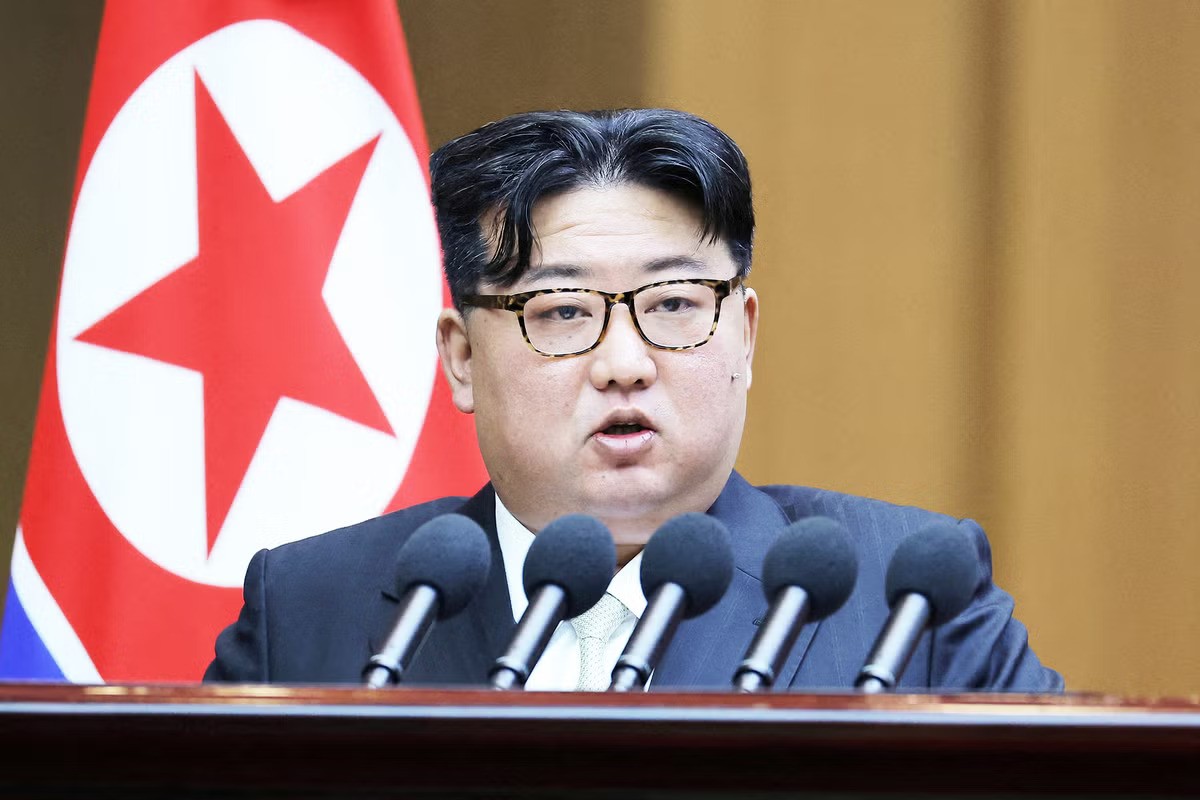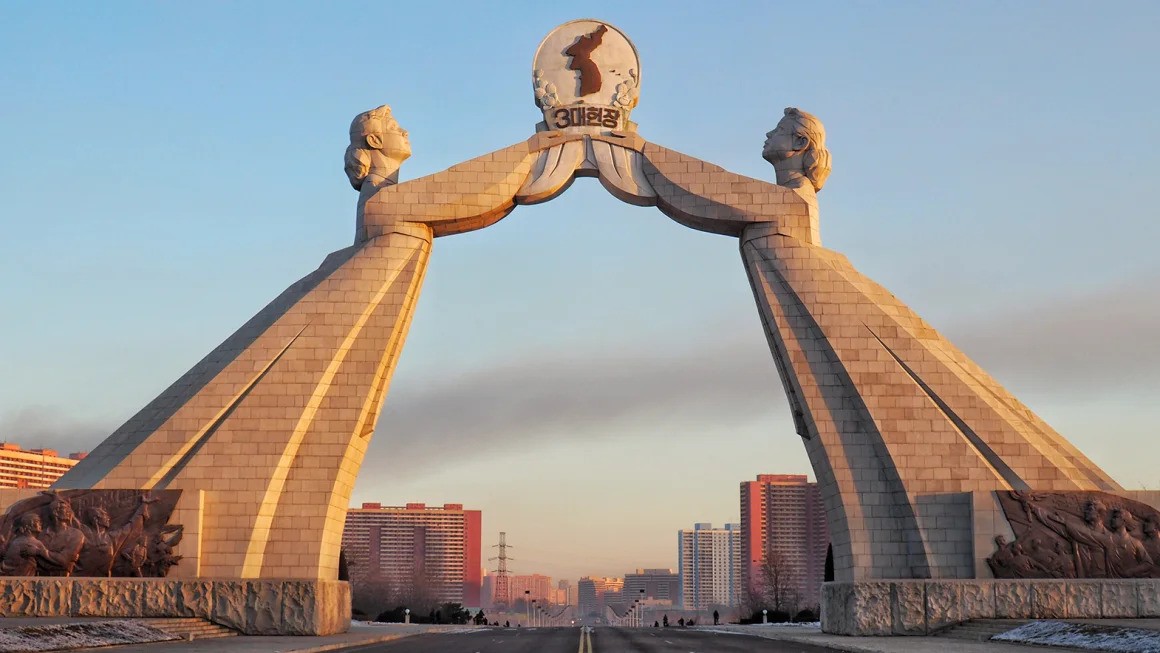Kim Vows To Dismantle Father's Unification Arch, Declares South Korea Principal Enemy
Kim vows to dismantle father's unification arch, declares South Korea principal enemy. The leader of North Korea, Kim Jong Un, announced on Monday that he intended to demolish a significant monument in Pyongyang that his father had built as a symbol of potential Korean Peninsula reunification.
Author:Hajra ShannonReviewer:Paula M. GrahamJan 16, 202424 Shares23.5K Views

Kim vows to dismantle father's unification arch, declares South Korea principal enemy. The leader of North Korea, Kim Jong Un, announced on Monday that he intended to demolish a significant monument in Pyongyang that his father had built as a symbol of potential Korean Peninsula reunification.
Kim referred to the monument as an "eyesore" during his speech at a Supreme People’s Assembly (SPA) meeting. This statement is part of a series of recent assertive remarks from Kim, including a New Year’s announcement indicating the termination of the North's policy of seeking reconciliation with South Korea.
In addition to advocating for the removal of the reunification monument, Kim announced the abolition of all agencies dedicated to promoting cooperation with Seoul. Simultaneously, he labeled the South as the North's "primary foe and invariable principal enemy." North Korea has been actively engaged in military activities in recent weeks, conducting artillery firings near a disputed border with the South and testing a ballistic missile equipped with a hypersonic glide vehicle.
The unprecedented act of tearing down a monument his father, Kim Jong Il, erected serves as a reminder of the North Korean leader's forceful rhetoric. This structure holds significance as it represents the enduring principles of his grandfather, Kim Il Sung. Experts suggest that this move signals a departure from decades of established North Korean policy.
The Kim family, with its lineage tracing back to Kim Il Sung, has maintained control over North Korea since its establishment in 1948, post-World War II. Although the North and South technically remain at war, both sides have consistently expressed the shared aspiration of peacefully reunifying the peninsula, considering each other as members of the same family.
Kim's recent rhetoric diverges from the goal of reunification, increasingly depicting South Korea as an unyielding adversary.
"Yesterday's speech shows that Kim Jong Un is establishing his own way of unification based on power, breaking Kim Il Sung and Kim Jong Il's legacy," said Jeong Eun-mee, a research fellow at the Korea Institute for National Unification.
"Demolition of the monument symbolically shows this," she said.
Situated along the Reunification Highway connecting Pyongyang to the demilitarized zone that divides North and South Korea, the Monument to the Three Charters for National Reunification stands as a nine-story arch, finished in 2001 after a two-year construction period.
This monument represents the collaborative efforts of Kim Jong Il and Kim Il Sung in establishing guidelines for the unification of North and South Korea. However, on Monday, Kim Jong Un boldly announced the definitive abandonment of reunification ideals.
“„We should completely remove the eyesore 'Monument to the Three Charters for National Reunification' … and take other measures so as to completely eliminate such concepts as 'reunification,' 'reconciliation' and 'fellow countrymen' from the national history of our Republic.- Kim Jong Un
According to Leif-Eric Easley, a professor at Ehwa University in Seoul, the departure from the unification strategies of Kim's father and grandfather indicates that "Kim is conveying a potent domestic message, emphasizing that North Korea's challenges are primarily externally influenced."
Rejecting Peaceful Reunification
One of Kim Jong Il's three charters, initially introduced by Kim Il Sung in the 1970s as a guiding principle in North Korean policy, emphasized achieving national reunification through peaceful means without resorting to arms.
However, on Monday, Kim stated that North Korea, officially known as the Democratic People’s Republic of Korea (DPRK), "does not seek war, but we also have no intention of avoiding it."
The North Korean leader expressed concern, noting that "the danger of the outbreak of a war due to a physical clash has considerably escalated," and he pledged that in the event of a war, the North would forcefully seize the entire peninsula.
During the same gathering that Kim addressed, North Korea's Parliament declared the dissolution of the Committee for the Peaceful Reunification of the Country, the National Economic Cooperation Bureau, and the Kumgangsan International Tourism Administration. These entities were initially established in collaboration with the Republic of Korea (ROK), the official name of South Korea.
“„It is a serious anachronistic mistake to regard the ROK as a partner for reconciliation and reunification any longer as it declared the DPRK as a principal enemy and is seeking only an opportunity for bringing down the government' and achieving unification by absorption.- KCNA
In the Defense White Paper for 2022, released in early 2023, South Korea included a notable statement: "For the first time in six years, the North Korean regime and the North Korean military are identified as our adversaries."
South Korea Not Backing Off
On Tuesday, South Korean leader Yoon Suk Yeol declared that his government would not be intimidated by Kim's recent threats.
"If North Korea provokes, we will punish them multiple times as hard," Yoon said at a Cabinet meeting in Seoul.
Yoon highlighted that Kim Jong Un denounced the Northern Limit Line (NLL), a contentious de facto border established by the United Nations after the Korean War in 1953, as illegitimate.
On Tuesday, Yoon characterized Kim’s dismissal of the NLL as "a politically provocative act aimed at dividing South Korea and unsettling our people."
The Northern Limit Line (NLL) extends three nautical miles from the North Korean coastline, placing five islands under South Korean control. In recent events, North Korea launched approximately 200 artillery rounds earlier this month, falling within a maritime buffer zone near the NLL.
Historically, North Korea has rejected the NLL, proposing an alternative line that would essentially extend the Demilitarized Zone (DMZ) southwest into the Yellow Sea, deviating from the North Korean shoreline.
Yoon, adopting a more assertive stance towards North Korea compared to his predecessors, clarified that South Korea's dispute is with the Kim regime, not the North Korean people. The South Korean constitution recognizes all Koreans on the peninsula as equal, with those from the North entitled to the same rights as their Southern counterparts. Yoon affirmed on Tuesday that the South would welcome defectors from the North.
"The government will not spare attention and support for the defectors to settle well in our society," Yoon said.

Hajra Shannon
Author

Paula M. Graham
Reviewer
Latest Articles
Popular Articles
